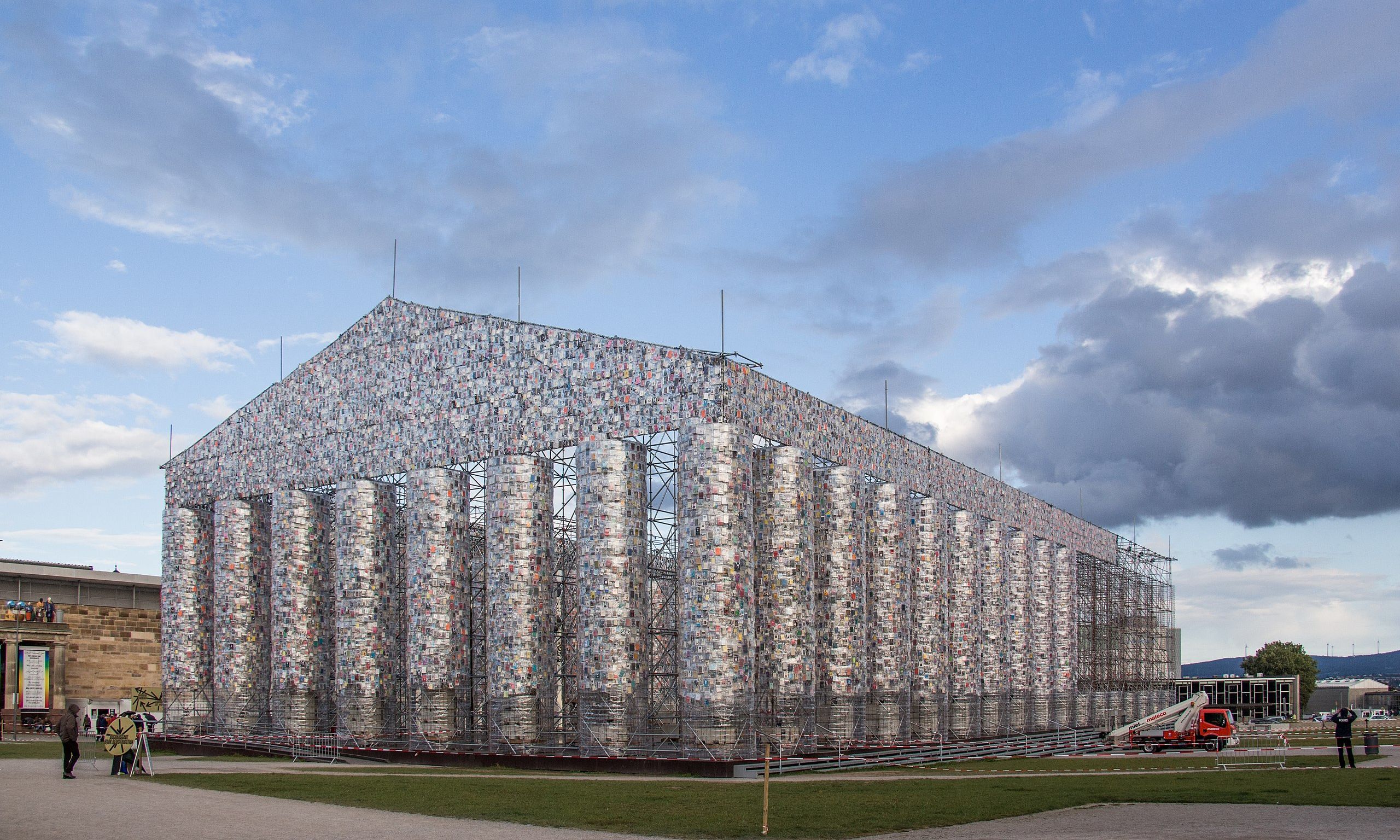Parthenon der Bücher at the 2017 Documenta 14 in Kassel
Photo: Paul Broeker via Wikimedia Commons
The four remaining members of a finding committee responsible for choosing the art director of the next Documenta have resigned en masse. Their decision comes after the departure of Ranjit Hoskoté, a writer who came under fire from the German media and government for signing a statement that was viewed as antisemitic.
The four panel members—Simon Njami, Gong Yan, Kathrin Rhomberg and María Inés Rodríguez—wrote in a letter to the Documenta management that they felt “grave concern for the future of Documenta.”
“If art is to take account of the complex cultural, political, and social realities of our present day, it needs appropriate conditions that allow for its diverse perspectives, perceptions and discourses,” they wrote. “The dynamics of the last few days, with their unchallenged media and public discrediting of our colleague Ranjit Hoskoté, which forced him to resign from the finding committee, make us very doubtful if this prerequisite for any coming edition of Documenta is currently given in Germany,” the letter said.
It added that Germany’s “awareness of special responsibilities” with regard to fighting antisemitism “runs the risk of being misused for opinion politics in order to suppress undesirable approaches and their broad and open discussion right from the start.”
During the last Documenta, which took place in 2022 and was curated by the Indonesian artists’ collective ruangrupa, the organisers had to remove several works containing antisemitic images. The director general of the show was forced to resign and a member of ruangrupa was asked to explain how events took this course in the German parliament.
The exhibition ended with an open letter from the curators and artists involved saying “we are angry, we are sad, we are tired” of what they described as “the chaos, hostility, racism and censorship that have engulfed this edition of Documenta.”
Hoskoté resigned earlier this week amid revelations that he signed a 2019 statement by BDS, the Boycott, Divestment, and Sanctions movement, which aims to mobilise international support for Palestinian causes and put political pressure on Israel. In an interview with the Süddeutsche Zeitung, German Culture Minister Claudia Roth described the statement Hoskoté signed as “clearly anti-Semitic and loaded with Israel-hostile conspiracy theories.”
In a letter to the Documenta management, Hoskoté said he felt judged in a “kangaroo court” and the accusations of antisemitism against him were “monstrous.” He said he felt pressurised “to accept a sweeping and untenable definition of antisemitism that doesn’t differentiate between the Jewish people and the Israeli state, that conflates the Jewish people with the Israeli state; and that, correspondingly, misrepresents any expression of sympathy with the Palestinian people as support for Hamas.”
The 2019 “Statement against consulate general of Israel, Mumbai’s event on Hindutva and Zionism” that Hoskoté signed described Zionism as a “racist ideology calling for a settler-colonial, apartheid state where non-Jews have unequal rights.” Hoskoté, who is Indian, said his signature was a protest at the attempt to equate Zionism with Hindutva, or Hindu nationalism.
The German parliament in 2019 passed a resolution describing BDS as “antisemitic.” In the Süddeutsche Zeitung interview, Roth threatened to withhold funding from Documenta unless “there is a common plan and visible reforms that result in clear responsibilities, a real possibility for the federal government to contribute and standards to prevent antisemitism and discrimination.”
Shortly before Hoskoté resigned, Bracha Lichtenberg Ettinger, an Israeli artist and philosopher, also stepped down from the six-member panel, saying she could felt she could not contribute in the light of Hamas’s attack on Israel and the Israeli response. Lichtenberg Ettinger said her decision was not related to Hoskoté’s departure, according to Documenta.
The organisers of Documenta 16, which is scheduled for 2027, have promised to address the antisemitism of the previous edition, including making organisational changes to prevent it happening again.
“The events of summer 2022 cannot be repeated,” Hoffmann said in the statement about Hoskoté’s departure.
The finding committee’s resignation casts doubts on the schedule for the next edition of Documenta. The new artistic direction for the next Documenta was scheduled to be announced at the end of this year or in early 2024.
Documenta said it “respects the decision” of the finding committee and will “propose to the supervisory board that the selection process should start from scratch.” It said it will also propose that decisions about the reorganisation should be completed before the process begins again.

